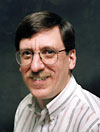
|
April
22, 1 p.m. PDT
Astronomy to Art: Making
Hubble Heritage
A
unique chance to watch the live progression of the
making of a Hubble image! We'll select an image to
follow over the course of the following webcasts,
showing you the steps along the way as it goes from
raw data to a full-color picture. And we'll talk with
people who bring Hubble's fantastic images to the
public. Part 2 of the previous program.
Preshow "warm-up" webcast

|
|
Do
you have a question you would like to ask our guests?
Email
the Webcast crew at
hubble@exploratorium.edu
Webcast
duration: 1 hour
An
archived version will be available one hour after
the end of the Webcast.
|
|

|
Today's Guests
:
 Mr.
Zoltan George Levay
is a computer image specialist and a member of the Hubble
Heritage team. He was born in Pakistan, of Hungarian parents,
came to the U.S. at the age of four, and grew up near Baltimore,
Maryland. Zoltan has a background in astronomy and, even
from a very early ages, a fascination with the magnificent
photographs made with the world's great telescopes. As a
Hubble Heritage Team member, his goal is to find and distribute
the most visually striking images from the Hubble Space
Telescope.
His
personal website:
http://opostaff.stsci.edu/~levay/
Mr.
Zoltan George Levay
is a computer image specialist and a member of the Hubble
Heritage team. He was born in Pakistan, of Hungarian parents,
came to the U.S. at the age of four, and grew up near Baltimore,
Maryland. Zoltan has a background in astronomy and, even
from a very early ages, a fascination with the magnificent
photographs made with the world's great telescopes. As a
Hubble Heritage Team member, his goal is to find and distribute
the most visually striking images from the Hubble Space
Telescope.
His
personal website:
http://opostaff.stsci.edu/~levay/
Lisa
M. Frattare
is an image processor on the Hubble Heritage Project. Her
specialty is creating three-color images of archival data
taken with the Hubble Space Telescope and releasing these
images to the public. Lisa has a background in science and
astronomy and she also helps plan and execute new Hubble
observations. Getting a Ph.D. is on Lisa's proverbial "to-do"
list and she's very active in promoting women in astronomy
through her work with the
American
Astronomical Society's Committee on the Status of Women
.
|
![]()
![]()